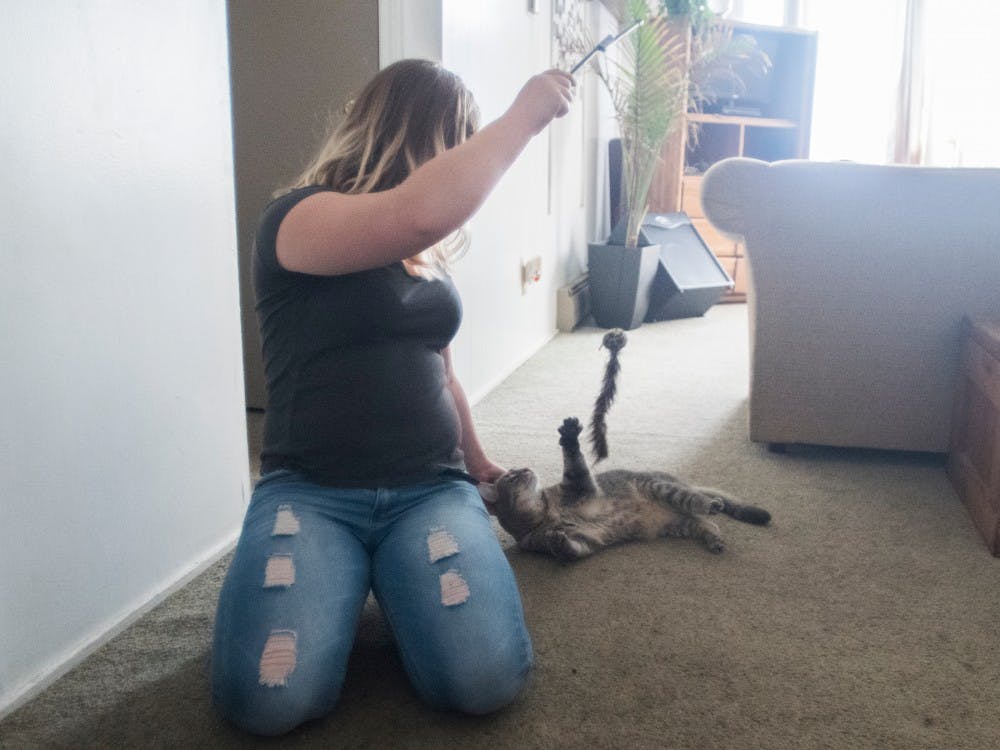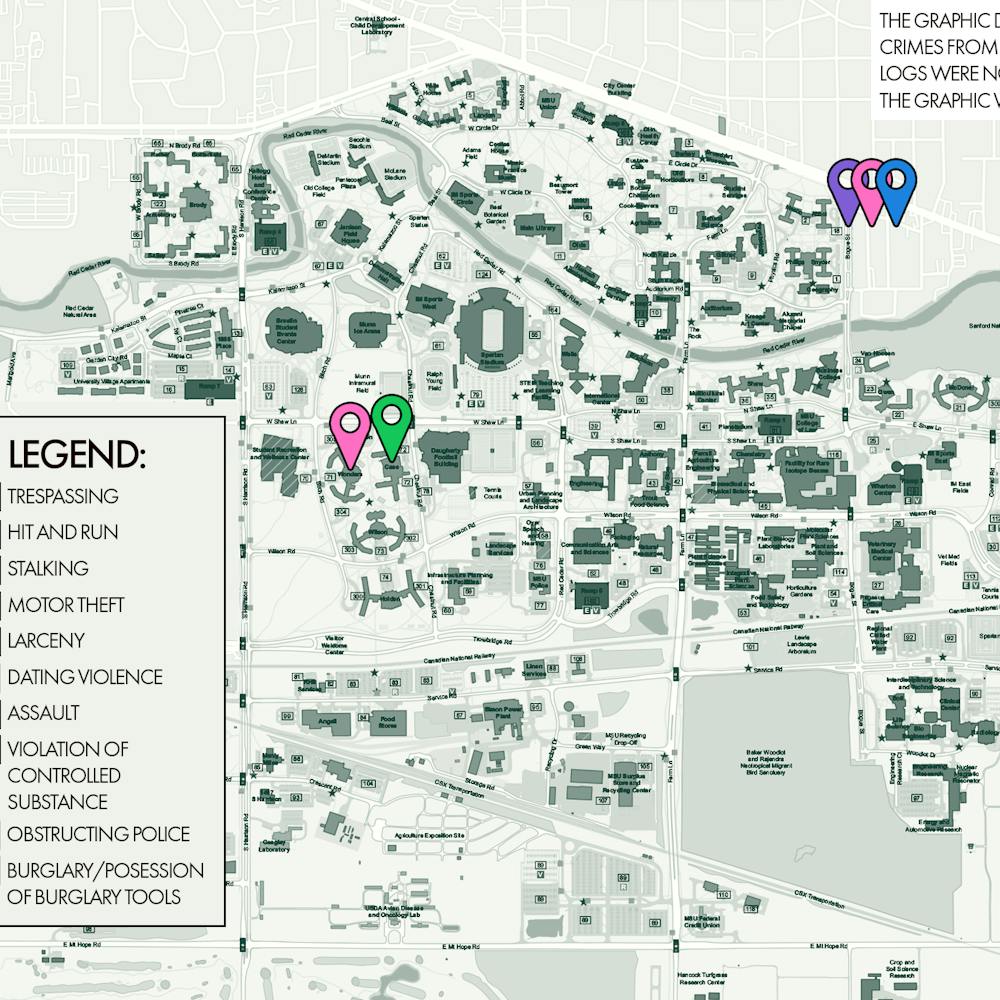During her sophomore year at MSU, political science senior Greta Carlson was taken to Sparrow Hospital for three days on suicide watch.
Carlson was suffering from depression and anxiety that stemmed from being sexually assaulted twice and being doubted when she told her story, she said.
Although she had just started counseling in the sexual assault program, it wasn’t enough to escape how she felt.
“I felt like it was eating me alive, a monster was taking over my being,” Carlson said. “They knew I had suicidal thoughts, they knew that I would walk around campus looking at each building thinking, ‘I could jump off that one, or that one.’ Just really irrational thoughts that clearly are not self-preserving like most normal, mentally-well people would have.”
After being on suicide watch, Carlson was prescribed the medication she needed.
She was also prescribed a different, fluffier sort of treatment.
Carlson described this treatment as her beautiful daughter, Kyle. Kyle is a cat, unofficially a domestic tabby shorthair, she said. She is also Carlson’s emotional support animal, or legal service animal, for Carlson’s emotional needs.
“I guess the easiest way to describe it is say you have a mental disorder, such as depression, anxiety, and you pretty much are not going to be able to get through each day without something to be there for you because human interactions have failed you,” Carlson said.
Carlson said a person gets an emotional support animal by talking to their psychiatrist. Depending on how severe their situation is, their psychiatrist will or will not grant them permission or prescribe them a support animal. Carlson said in her case, she had been through enough trauma that her psychiatrist thought it was an amazing idea for her to have a support animal.
Now, most people around the apartment loves Kyle, and she keeps Carlson’s and her roommate’s anxiety down, Carlson said.
However, not everyone is as accepting of Kyle.
Carlson said she had to fight to stay in her apartment at Cedarbrook Apartments, managed by Prime Housing Group.

Carlson, who lived in the apartments last year, said she tried to renew her lease early. Because Carlson doesn’t have a car or moped, she wanted to stay in that location, as it is very close to campus and listed at a reasonable price.
At first, she tried getting the same apartment, but Prime Housing Group said they already leased it. Carlson tried seeing if any other units were open, but they denied her access to those as well.
When asked why they were denying her, they said they didn’t have to give her a reason. This piqued Carlson’s suspicions, she said.
“I asked them, ‘Is this about my cat?’ and they repeated, ‘We’re not required to give you an answer’ in a more negative tone,” Carlson said. “And so I instantly suspected that it was because they didn’t like the fact that I had my cat in here and they were going to get rid of me as soon as they possibly could, which was the end of the lease term.”
When a tenant signs with Prime Housing Group, they are sent a welcome email with some of the ground rules of the apartment. It states:
“PETS: SORRY NO PETS - THERE WILL BE A $100.00 PER DAY CHARGE EACH TIME A PET IS SEEN, HEARD, OR OTHERWISE OBSERVED IN YOUR APARTMENT.”
Kyle is not a pet though, Carlson said.
“There’s a very broad line, it’s not even a fine line,” she said. “If you have just a pet without any sort of official documentation from a doctor, then that housing provider is legally allowed to charge you however much money they want to per day you have that animal. But this is like any other prescription.”
According to the Prime Housing Group website, “All real estate advertised herein is subject to the Federal Fair Housing Act, which makes it illegal to advertise any preference, limitations, or discrimination based on race, color, religion, sex, handicap, familial status, or national origin, or intention to make any such preference, limitation or discrimination.”
According to the MSU Animal Legal and Historical Center website, if a tenant meets a certain set of criteria, such as a physical or mental impairment, then the U.S. Department of Housing and Urban Development states the Federal Housing Administration, or FHA, requires an exception to a “no pets” rule.
Carlson knew she had rights, and she knew she had to fight for them, she said. She got some professional help and managed to win back the apartment and a monetary compensation.
“It all worked out, but it didn’t work out the easy way and it didn’t work out the fair way,” Carlson said. “It took legal action. So fight for your rights.”
Social work senior Sierra Baker is a friend of Carlson’s and a fellow cat owner. She said that she and Carlson talk about their cats together.
“I know Kyle brings joy into Greta’s life,” Baker said.
Baker lives in East Knolls Apartments, managed through DTN Management. According to their website, DTN Management has a pet policy that allows cats.
Baker said she didn’t initially plan to have a cat in college, but got her first cat, Oslo, as a surprise birthday gift. This past June she got her second cat, Juniper, so Oslo would have a friend when Baker was busy and gone.
Baker said she noticed some positive changes in her emotional state after she got cats.
“I felt happier, I felt less alone,” she said. “On bad days and days I felt alone, I felt less alone. To that cat, you are important.”
Baker said if someone wants to get a pet, they need to make sure they can not only afford it, but that they also have secure housing lined up. She said it’s not fair to get an animal just to find out they can’t keep it.
But for those who can keep their animals, whether it’s because it’s an emotional support animal or their housing company allows them, a pet can be a great emotional support, much like Kyle is for Carlson. Carlson said she has reached a point where she can function without medication, but she still loves her fluffier form of treatment.
“She kind of stables me out when I’m freaking out, she’ll come and snuggle with me in bed,” Carlson said. “She’s always been there for me when other people haven’t been, and I’m her mother. It’s a good feeling to be able to take care of something so important and have them love you for it. It’s just very therapeutic, the whole thing of it.”







